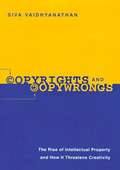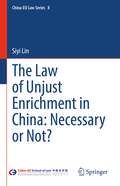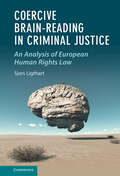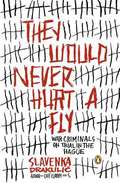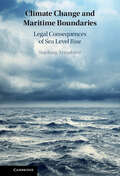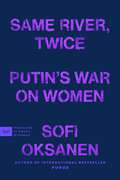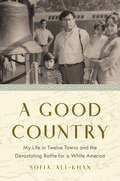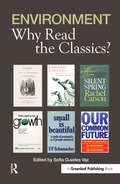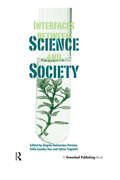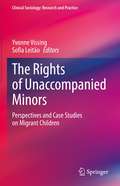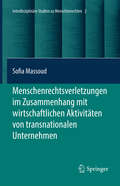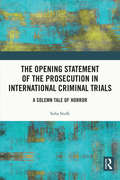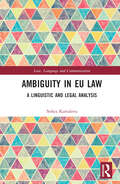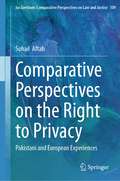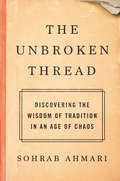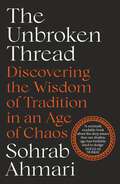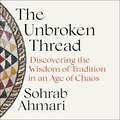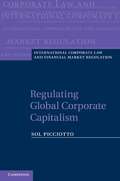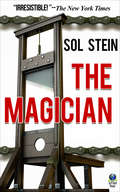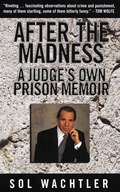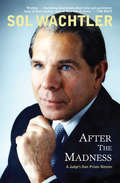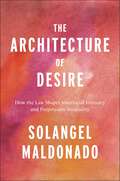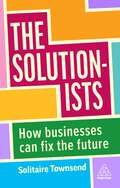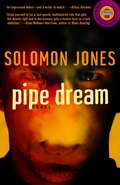- Table View
- List View
Copyrights And Copywrongs
by Siva Vaidhyanathanexplores the history of copyright law and its evolution into something akin to property law, and warns of the consequences of this trend.
The Law of Unjust Enrichment in China: Necessary or Not? (China-EU Law Series #8)
by Siyi LinThis book is the first book focusing on the Chinese law of unjust enrichment in English and introducing it to Western jurisdictions. Unjust enrichment is currently one of the most controversial areas of law in many jurisdictions and rife with academic debate. This book analyzes the historical evolution, current doctrines, and relationships of unjust enrichment with other areas of private law in China. It also provides insights into judicial practice. In May 2020, China promulgated its first-ever Civil Code since the establishment of the People's Republic of China, which is a milestone in the history of Chinese law. Before the Civil Code, there was only one legal provision regulating unjust enrichment, which requires a person obtaining benefits “without a legal basis” to return such benefits. However, the new Civil Code contains a separate chapter regulating unjust enrichment. This book analyzes and evaluates those new provisions in the Civil Code to provide a most up-to-date analysis of the Chinese law of unjust enrichment.
Coercive Brain-Reading in Criminal Justice: An Analysis of European Human Rights Law (Law and the Cognitive Sciences)
by Sjors LigthartEmerging neurotechnology offers increasingly individualised brain information, enabling researchers to identify mental states and content. When accurate and valid, these brain-reading technologies also provide data that could be useful in criminal legal procedures, such as memory detection with EEG and the prediction of recidivism with fMRI. Yet, unlike in medicine, individuals involved in criminal cases will often be reluctant to undergo brain-reading procedures. This raises the question of whether coercive brain-reading could be permissible in criminal law. Coercive Brain-Reading in Criminal Justice examines this question in view of European human rights: the prohibition of ill-treatment, the right to privacy, freedom of thought, freedom of expression, and the privilege against self-incrimination. The book argues that, at present, the established framework of human rights does not exclude coercive brain-reading. It does, however, delimit the permissible use of forensic brain-reading without valid consent. This cautionary, cutting-edge book lays a crucial foundation for understanding the future of criminal legal proceedings in a world of ever-advancing neurotechnology.
Bounded Rationality and Economic Diplomacy
by Skovgaard Poulsen, Lauge N.Modern investment treaties give private arbitrators power to determine whether governments should pay compensation to foreign investors for a wide range of sovereign acts. In recent years, particularly developing countries have incurred significant liabilities from investment treaty arbitration, which begs the question why they signed the treaties in the first place. Through a comprehensive and timely analysis, this book shows that governments in developing countries typically overestimated the economic benefits of investment treaties and practically ignored their risks. Rooted in insights on bounded rationality from behavioural psychology and economics, the analysis highlights how policy-makers often relied on inferential shortcuts when assessing the implications of the treaties, which resulted in systematic deviations from fully rational behaviour. This not only sheds new light on one of the most controversial legal regimes underwriting economic globalization but also provides a novel theoretical account of the often irrational, yet predictable, nature of economic diplomacy.
They Would Never Hurt a Fly
by Slavenka Drakulic"Who were they? Ordinary people like you or me—or monsters?” asks internationally acclaimed author Slavenka Drakulic as she sets out to understand the people behind the horrific crimes committed during the war that tore apart Yugoslavia in the 1990s. Drawing on firsthand observations of the trials, as well as on other sources, Drakulic portrays some of the individuals accused of murder, rape, torture, ordering executions, and more during one of the most brutal conflicts in Europe in the twentieth century, including former Serbian president Slobodan Miloševic; Radislav Krstic, the first to be sentenced for genocide; Biljana Plavšic, the only woman accused of war crimes; and Ratko Mladic, now in hiding. With clarity and emotion, Drakulic paints a wrenching portrait of a country needlessly torn apart. .
Climate Change and Maritime Boundaries: Legal Consequences of Sea Level Rise
by Snjólaug ÁrnadóttirCoastal States exercise sovereignty and sovereign rights in maritime zones, measured from their coasts. The limits to these maritime zones are bound to recede as sea levels rise and coastlines are eroded. Furthermore, ocean acidification and ocean warming are increasingly threatening coastal ecosystems, which States are obligated to protect and manage sustainably. These changes, accelerating as the planet heats, prompt an urgent need to clarify and update the international law of maritime zones. This book explains how bilateral maritime boundaries are established, and how coastal instability and vulnerable ecosystems can affect the delimitation process through bilateral negotiations or judicial settlement. Árnadóttir engages with core concepts within public international law to address emerging issues, such as diminishing territory and changing boundaries. She proposes viable ways of addressing future challenges and sets out how fundamental changes to the marine environment can justify termination or revision of settled maritime boundaries and related agreements.
Same River, Twice: Putin's War on Women
by Sofi Oksanen“In Same River, Twice, one of Europe's leading novelists uses her personal experience to shed light on the personal experiences of others: ordinary women trapped in the crossfire of a great geopolitical game.” —Benjamin Moser, Pulitzer Prize-winning author of Sontag: Her Life and Work“It’s one of those books that can truly change a reader's life. . . . A powerful, unforgettable read.” —Andrey Kurkov, award-winning author of Grey Bees and The Silver BoneBlending the journalistic rigor of Masha Gessen with the call to action of We Should All Be Feminists, a searing denunciation of Putin’s Russia, revealing how modern Russia’s history of weaponizing sexual violence against women plays a crucial role in its current strategy to retain political influence and dominance abroadOn March 22, 2023, the Swedish Academy organized a conference on threats to democracy and freedom of expression featuring a slate of distinguished speakers including Arundhati Roy, Timothy Snyder, and Sofi Oksanen. Oksanen’s address—entitled “Putin's War on Women”— would go on to spark such interest that the acclaimed Finnish writer felt compelled to return to it as the basis for a larger, more in-depth look at Putin’s threat to women. The result is Same River, Twice, a devastating book-length essay that incisively builds on the themes and arguments first presented in her powerful speech.During the Soviet occupation of Estonia, Oksanen's great-aunt was arrested and brutally interrogated overnight. Left permanently traumatized by the experience, she would never speak again. Using her family story as a starting point, Oksanen launches an investigation into the systematic crimes that the Russian government has, for nearly a century, committed with impunity. From the Russian military's entry into Berlin in 1945 to its modern invasion of Ukraine, Russia has continually employed violence against women when combatting its enemies. Life for women in Putin's Russia is little better; gender equality is in decline, women are silenced by the legal system, and rape is used to humiliate victims, especially women in media.Through Oksanen's sober analysis a disturbing picture emerges: under Putin, misogyny has become foundational to the state’s power. It underpins the current regime, serves as a means of weaving international alliances, and forms an essential part of Russia’s ongoing genocide in Ukraine, in turn posing a threat to the rights of women and minorities worldwide. As threats to democracy grow stronger across the globe, the powerful and timely Same River, Twice is a warning that cannot not be ignored.Translated from the Finnish by Owen F. Witesman
A Good Country: My Life in Twelve Towns and the Devastating Battle for a White America
by Sofia Ali-KhanA leading advocate for social justice excavates the history of forced migration in the twelve American towns she&’s called home, revealing how White supremacy has fundamentally shaped the nation. &“At a time when many would rather ban or bury the truth, Ali-Khan bravely faces it in this bracing and necessary book.&”—Ayad Akhtar, Pulitzer Prize–winning author of Homeland Elegies Sofia Ali-Khan&’s parents emigrated from Pakistan to America, believing it would be a good country. With a nerdy interest in American folk history and a devotion to the rule of law, Ali-Khan would pursue a career in social justice, serving some of America&’s most vulnerable communities. By the time she had children of her own—having lived, worked, and worshipped in twelve different towns across the nation—Ali-Khan felt deeply American, maybe even a little extra American for having seen so much of the country. But in the wake of 9/11, and on the cusp of the 2016 election, Ali-Khan&’s dream of a good life felt under constant threat. As the vitriolic attacks on Islam and Muslims intensified, she wondered if the American dream had ever applied to families like her own, and if she had gravely misunderstood her home. In A Good Country, Ali-Khan revisits the color lines in each of her twelve towns, unearthing the half-buried histories of forced migration that still shape every state, town, and reservation in America today. From the surprising origins of America&’s Chinatowns, the expulsion of Maroon and Seminole people during the conquest of Florida, to Virginia&’s stake in breeding humans for sale, Ali-Khan reveals how America&’s settler colonial origins have defined the law and landscape to maintain a White America. She braids this historical exploration with her own story, providing an intimate perspective on the modern racialization of American Muslims and why she chose to leave the United States. Equal parts memoir, history, and current events, A Good Country presents a vital portrait of our nation, its people, and the pathway to a better future.
Environment: Why Read The Classics?
by Sofia Guedes VazEnvironment: Why Read the Classics? presents six important essays by some of the world's leading environmental thinkers on six of the most emblematic books ever written on the environment. The books – Walden; A Sand County Almanac; Small is Beautiful; Silent Spring; The Limits to Growth; and Our Common Future – taken together have been hugely important in the development of global environmental awareness, activism and policy. The essayists – Viriato Soromenho-Marques, J. Baird Callicott, José Lima Santos, Tim O'Riordan, Satish Kumar and Marina Silva – invite readers to reflect on these ground-breaking works and examine their historical importance, as well as what they should mean to us today and what relevance they will have to future generations. More than just books about the environment, these are also philosophical treatises, in that they increase our understanding of the natural world and of ourselves, calling us "to weigh and consider", as Bacon put it. In particular, they make us reflect on the need to constantly redefine the purposes of progress, the economy and society. How we relate to nature is a crucial aspect in the plans we make as a species, and as individuals; and every one of these books inspires a more respectful relationship, both with nature and humanity, and consequently with ourselves. The six essays in this book are the result of a series of conferences organised in Lisbon by the Calouste Gulbenkian Foundation with the support of the American Embassy in Portugal. Its *raison d'être* was to revisit the ideas that have shaped the environmental movement, seeking inspiration to deal with what looks like a very challenging future. The significance of such timeless concepts is now more apparent than ever; and these evergreen books are full of ideas that retain their spark even in our difficult times. This is what makes them classics. Environment: Why Read the Classics? is a provocative book and will be essential reading for all those concerned about the state of the world.
Interfaces between Science and Society
by Ângela Guimarães Pereira Sofia Guedes Vaz Sylvia TognettiThe project of science has been to provide answers to questions about the world and how it works. Often, this lofty role has been characterised by a narrow and dogmatic scientific training, an unwillingness to communicate to differing stakeholder needs, a refusal to accept and to manage uncertainty, complexity and value commitments, and the reduction of knowledge assessment to colleague peer review on narrowly technical issues. Times have changed. As the world faces increasingly disparate challenges, science is subjected to increasingly vehement demands from a society calling for transparency, openness and public participation in science policy. Science is going through an evolutionary process. Perhaps the most painful process it has ever encountered. Research on the interfaces between science and society is a burgeoning area. A new conception of knowledge now appears to be emerging, based on the awareness of complexity, uncertainty and a plurality of legitimate perspectives and interests. Democracy is extending into the previously quite exclusive scientific realm, and science must now submit to public scrutiny and participation in the governance of knowledge. This book provides much-needed reflections on the methods and tools for knowledge quality assurance, particularly on its inputs to extended policy and decision-making processes. The overall aim is to improve the relationship between science and society. The discussion involves six themes: communicating between plural perspectives; accepting and learning how to manage uncertainty, complexity and value commitments; acknowledging new conceptions of knowledge; implementing transparency, openness and participation in science policy; valuing community-based research; and exploring how new ICT can support inclusive governance. Taken together, these themes provide both a framework and vision on how to conceive, discuss and evaluate the changes that are occurring. The chapters cover theory, practice, approaches, experiences, ideas and suggestions for a move beyond "talking the talk" to "walking the walk". Science and policy interfaces are dynamic processes needing to permanently redefine themselves and their roles. This book contributes to the enrichment and deepening of our understanding of these important new trends in the social relations of science, which are fundamental to our understanding of the prospects for further progress. The book will be essential reading for scientists, policy-makers, managers and the public.
The Rights of Unaccompanied Minors: Perspectives and Case Studies on Migrant Children (Clinical Sociology: Research and Practice)
by Yvonne Vissing Sofia LeitãoThis volume explores the various challenges faced by migrant unaccompanied children, using a clinical sociological approach and a global perspective. It applies a human rights and comparative framework to examine the reception of unaccompanied children in European, North American, South American, Asian and African countries. Some of the important issues the volume discusses are: access of displaced unaccompanied children to justice across borders and juridical contexts; voluntary guardianship for unaccompanied children; the diverse but complementary needs of unaccompanied children in care, which if left unaddressed can have serious implications on their social integration in the host societies; and the detention of migrant children as analyzed against the most recent European and international human rights law standards. This is a one-of-a-kind volume bringing together perspectives from child rights policy chairs across the world on a global issue. The contributions reflect the authors’ diverse cultural contexts and academic and professional backgrounds, and hence, this volume synthesizes theory with practice through rich firsthand experiences, along with theoretical discussions. It is addressed not only to academics and professionals working on and with migrant children, but also to a wider, discerning public interested in a better understanding of the rights of unaccompanied children.
Menschenrechtsverletzungen im Zusammenhang mit wirtschaftlichen Aktivitäten von transnationalen Unternehmen (Interdisciplinary Studies in Human Rights #2)
by Sofia MassoudDieses Buch analysiert, ob und wie transnationale Unternehmen durch rechtliche Bindungen effektiv zur Einhaltung elementarer Menschenrechte verpflichtet werden können. Darüber hinaus werden auch die gesellschaftspolitischen Aussichten möglicher Strategien reflektiert. Das Buch zielt zwar auf alle Arten von Menschenrechten. Der Untersuchungsgegenstand ist jedoch bewusst auf die Kernarbeitsnormen der ILO beschränkt. Das Werk berücksichtigt gesellschaftsrechtlich verbundene Unternehmen ebenso wie die Möglichkeit einer Regulierung zum Schutz vor Menschenrechtsverletzungen im Zusammenhang mit wirtschaftlichen Aktivitäten von Unternehmen in globalen Lieferketten. Das Buch untersucht privatrechtliche und völkerrechtliche Strategien. Anhand ausgewählter Ansätze kommt die Autorin zu dem Ergebnis, dass keine rechtliche Notwendigkeit für den gegenwärtigen Zustand eines defizitären Schutzes vor Menschenrechtsverletzungen im Zusammenhang mit wirtschaftlichen Aktivitäten von Unternehmen besteht. Die Autorin legt dar, dass Defizite der Diskussion auch darin bestehen, dass regelmäßig eine Reflexion der Durchsetzungschancen und -möglichkeiten der an sich notwendigen rechtspolitischen Strategien fehlt.
The Opening Statement of the Prosecution in International Criminal Trials: A Solemn Tale of Horror
by Sofia StolkThis book addresses the discursive importance of the prosecution’s opening statement before an international criminal tribunal. Opening statements are considered to be largely irrelevant to the official legal proceedings but are simultaneously deployed to frame important historical events. They are widely cited in international media as well as academic texts; yet have been ignored by legal scholars as objects of study in their own right. This book aims to remedy this neglect, by analysing the narrative that is articulated in the opening statements of different prosecutors at different tribunals in different times. It takes an interdisciplinary approach and looks at the meaning of the opening narrative beyond its function in the legal process in a strict sense, discussing the ways in which the trial is situated in time and space and how it portrays the main characters. It shows how perpetrators and victims, places and histories, are juridified in a narrative that, whilst purporting to legitimise the trial, the tribunal and international criminal law itself, is beset with tensions and contradictions. Providing an original perspective on the operation of international criminal law, this book will be of considerable interest to those working in this area, as well as those with relevant interests in International/Transnational Law more generally, Critical Legal Studies, Law and Literature, Socio-Legal Studies, Law and Geography and International Relations.
Ambiguity in EU Law: A Linguistic and Legal Analysis (Law, Language and Communication)
by Sofiya KartalovaAmbiguity – an expression or utterance giving rise to at least two mutually exclusive interpretations – has been traditionally regarded as an ever-present, and therefore trivial, feature of EU law, alongside other forms of linguistic indeterminacy. At the same time, ambiguity has been condemned as a perilous defect in the legal text, since it is commonly assumed that the Court of Justice of the EU (CJEU) would necessarily exploit it to engage in judicial activism. In contrast, more recent theories present ambiguity as a means of promoting greater acceptability and coherence, while trusting the CJEU’s willingness to exert judicial restraint for the benefit of judicial co-operation. This ground-breaking work challenges some of the theoretical assumptions about ambiguity in EU law and puts forward a more accurate and complete theory about the CJEU’s strategic use of ambiguity. Ambiguity is here transformed from an underestimated or misunderstood detail of undetermined significance to a desirable systemic feature of the EU legal order with concrete properties and impact. Ambiguity as the implicit basis of the CJEU’s decision-making is shown to be strategically valuable for the implementation of the authority of EU law at some of the most pivotal moments in the evolution of the EU legal order. This interdisciplinary investigation presents in-depth linguistic and legal analysis of ambiguity found in the text of key provisions of EU Treaties and in the language of some of the CJEU’s leading preliminary rulings in the area of fundamental rights, freedom of movement and EU citizenship. The book suggests a categorisation of examples, basic guidance about the type of case and situation where the phenomenon is likely to emerge as well as an assessment of the advantages and disadvantages of this unusual judicial technique. The book will be a valuable resource for researchers and academics working in the areas of Law and Language, Public International Law, EU Law and Multilingualism.
Comparative Perspectives on the Right to Privacy: Pakistani and European Experiences (Ius Gentium: Comparative Perspectives on Law and Justice #109)
by Sohail AftabThis book focuses on devising a comprehensive protective mechanism for the right to privacy in Pakistan. It argues that the existing legal regime lacks an effective remedy for victims of privacy violations and emphasizes the need for comprehensive legislation to safeguard this crucial right. Pursuing a multidisciplinary approach, the book thoroughly explores the issue of media intrusions into people’s privacy through thematic media content analysis and highlights the significant impacts of these intrusions on victims’ lives.In the process, the book addresses various conceptual aspects, their relevance, and their implications for privacy-related disputes during adjudication. Recognizing that theoretical underpinnings alone may not be sufficient to create a legal regime “from scratch,” it explores the enforcement of the right to privacy under the European Convention on Human Rights (ECHR), as interpreted and enforced by the European Court of Human Rights (ECtHR).The book subsequently goes beyond exploring international law by analyzing the impact of media-and-privacy cases on privacy protection in two major member states: Germany (a civil law jurisdiction) and the United Kingdom (a common law jurisdiction). Drawing upon these conceptual and comparative legal deliberations and findings, the book provides concrete guidelines for a new privacy law in Pakistan.
The Unbroken Thread: Discovering the Wisdom of Tradition in an Age of Chaos
by Sohrab AhmariWe&’ve pursued and achieved the modern dream of defining ourselves—but at what cost? The New York Post op-ed editor makes a compelling case for seeking the inherited traditions and ideals that give our lives meaning.&“Ahmari&’s tour de force makes tradition astonishingly vivid and relevant for the here and now.&”—Rod Dreher, bestselling author of Live Not by Lies and The Benedict OptionAs a young father and a self-proclaimed &“radically assimilated immigrant,&” opinion editor Sohrab Ahmari realized that when it comes to shaping his young son&’s moral fiber, today&’s America comes up short. For millennia, the world&’s great ethical and religious traditions taught that true happiness lies in pursuing virtue and accepting limits. But now, unbound from these stubborn traditions, we are free to choose whichever way of life we think is most optimal—or, more often than not, merely the easiest. All that remains are the fickle desires that a wealthy, technologically advanced society is equipped to fulfill.The result is a society riven by deep conflict and individual lives that, for all their apparent freedom, are marked by alienation and stark unhappiness.In response to this crisis, Ahmari offers twelve questions for us to grapple with—twelve timeless, fundamental queries that challenge our modern certainties. Among them: Is God reasonable? What is freedom for? What do we owe our parents, our bodies, one another? Exploring each question through the life and ideas of great thinkers, from Saint Augustine to Howard Thurman and from Abraham Joshua Heschel to Andrea Dworkin, Ahmari invites us to examine the hidden assumptions that drive our behavior and, in so doing, to live more humanely in a world that has lost its way.
The Unbroken Thread: Discovering the Wisdom of Tradition in an Age of Chaos
by Sohrab Ahmari'A serious - and seriously readable - book about the deep issues that our shallow age has foolishly tried to dodge' - Douglas Murray 'A crystal-clear analysis of the multiple failures of "me-first" contemporary liberalism' - Giles FraserFor millennia, philosophical, ethical and theological reflection was commonplace among the intellectually curious. But the wisdom that some of the greatest minds across the centuries continue to offer us remains routinely ignored in our modern pursuit of self-fulfilment, economic growth and technological advancement. Sohrab Ahmari, the influential Op-Ed editor at the New York Post, offers a brilliant examination of our postmodern Western culture, and an analysis of the paradox at its heart: that the 'freedoms' we enjoy - to be or do whatever we want, subject only to consent, with everything morally neutral or relative - are at odds with the true freedom that comes from the pursuit of the collective good. Rather than the insatiable drive to satisfy our individual appetites, this collective good involves self-sacrifice and self-control. It requires us to diminish so that others may grow. What responsibility do we have to our parents? Should we think for ourselves? Are sexual ethics purely a private matter? How do we justify our lives? These, and other questions - explored in the company of a surprising range of ancient and contemporary thinkers - reveal how some of the most ancient moral problems are as fresh and relevant to our age as they were to our ancestors.By plumbing the depths of each question, the book underscores the poverty of our contemporary narratives around race, gender, privilege (and much else), exposing them as symptoms of a deep cultural crisis in which we claim a false superiority over the past, and helps us work our way back to tradition, to grasp at the thin, bare threads in our hands, while we still can.
The Unbroken Thread: Discovering the Wisdom of Tradition in an Age of Chaos
by Sohrab AhmariSohrab Ahmari challenges the postmodern Western worldview by asking 12 timeless, fundamental questions about life - and reveals that true freedom and happiness is found in the wisdom of traditional thought.We've pursued and achieved the modern dream of defining ourselves - but at what cost? The influential New York Post op-ed editor makes a compelling case for the modern person to seek the inherited traditions and ideals that give our lives meaning.As a young father and a self-proclaimed 'radically assimilated immigrant' opinion editor Sohrab Ahmari realised that when it comes to morals and principles he'd want his son to inherit, today's America comes up short. For millennia, the world's great moral and religious traditions taught that true happiness lies in pursuing virtue - and accepting limits. But now, free from these stubborn traditions, we all exercise some degree of liberty to live the way we think is most optimal - or, more often than not, merely the easiest. All that remains are the fickle desires that a wealthy, technologically advanced society is equipped to fulfill.In response to this crisis, Ahmari offers twelve questions for us to grapple with - twelve timeless, fundamental queries that challenge our modern certainties. Among them: Is God reasonable? What is freedom? What do we owe our parents, our bodies, each other? Drawing on historical and contemporary figures from Saint Augustine to Howard Thurman to Abraham Joshua Heschel, he invites us to consider the hidden beliefs that drive our behaviour, and in so doing, recapture a more human way of living in a world that has lost its way.(P) 2021 Penguin Audio
Regulating Global Corporate Capitalism
by Sol PicciottoThis analysis of how multi-level networked governance has superseded the liberal system of interdependent states focuses on the role of law in mediating power and shows how lawyers have shaped the main features of capitalism, especially the transnational corporation. It covers the main institutions regulating the world economy, including the World Bank, the IMF, the WTO and a myriad of other bodies, and introduces the reader to key regulatory arenas: corporate governance, competition policy, investment protection, anti-corruption rules, corporate codes and corporate liability, international taxation, avoidance and evasion and the campaign to combat them, the offshore finance system, international financial regulation and its contribution to the financial crisis, trade rules and their interaction with standards especially for food safety and environmental protection, the regulation of key services (telecommunications and finance), intellectual property and the tensions between exclusive private rights and emergent forms of common and collective property in knowledge.
The Magician
by Sol SteinA vicious high school fight leads to a terrifying miscarriage of justice in this &“superior&” legal thriller by the celebrated author: &“A spectacular read&” (The New York Times). For sixteen-year-old Ed Japhet, high school prom is a moment to shine. Performing a magic act for his classmates and teachers, Ed scares the wits out of them with feats that include the use of a trick guillotine. But while Ed&’s act pleases the crowd, it upsets a young hoodlum named Stanislaus Urek who doesn&’t like being made to look foolish. Catching up to Ed and his girlfriend in the parking lot, Urek beats Ed within an inch of his promising life. Everyone knows Urek should be behind bars. But while Ed survives the merciless attack, the fight has only begun. Urek&’s father hires a lawyer named Thomassy who knows a few tricks of his own. In a protracted legal battle, Thommasy discredits some witnesses and intimidates others until American justice looks like nothing but smoke and mirrors in this &“fast-moving, incisive&” thriller (Library Journal).
After the Madness: A Judge's Own Prison Memoir
by Sol WachtlerStory of a New York state supreme court judge and how his career was destroyed by drugs and severe mental illness. Wachtler here publishes a journal telling of his prison experience and the events that led up to it.
After the Madness: A Judge's Own Prison Memoir
by Sol WachtlerDriving down the Long Island Expressway in November of 1992, Sol Wachtler was New York&’s chief judge and heir apparent to the New York governorship. Suddenly, three van loads of FBI agents swerved in front of him—bringing his car and his legal career to a halt. Wachtler's subsequent arrest, conviction, and incarceration for harassing his longtime lover precipitated a media feeding frenzy, revealing to the world his struggles with romantic attachment, manic depression, and drug abuse.In this, his prison diary, Wachtler reveals the stark reality behind his vertiginous fall from the heights of the legal establishment to the underbelly of the criminal justice system. Sentenced to a medium security prison in Butner, North Carolina, Wachtler is stabbed by an unseen assailant, berated by prison guards, and repeatedly placed in solitary confinement with no explanation. Moreover, as a prisoner he confronts firsthand the inequities of a system his judicial rulings helped to construct and befriends the type of people he once sentenced.With unflinching honesty, Wachtler draws on his unique experience of living life on both sides of the bench to paint a chilling portrait of prison life interwoven with a no‑holds‑barred analysis of the shortcomings of the American legal justice system.
The Architecture of Desire: How the Law Shapes Interracial Intimacy and Perpetuates Inequality (Families, Law, and Society #26)
by Solangel MaldonadoExplores the reach of the law into our most personal and private romantic livesThe Architecture of Desire examines how the law influences our most personal and private choices—who we desire and choose as intimate partners—and explores the psychological, economic, and social effects of these choices. Romantic preferences, as shaped by law, perpetuate segregation and subordination by limiting, on the basis of race, individuals’ prospects for marriage and marriage-like commitments, as well as economic and social mobility.The book begins by tracing the legacy of slavery, anti-miscegenation, segregation, and racially discriminatory immigration laws to show how this legal landscape facilitated the residential, economic, and social distance between racial and ethnic groups, which in turn continue to shape romantic preferences today. Solangel Maldonado argues that the law further influences intimate choices by structuring the spaces within which individuals meet and interact via practices such as redlining, gentrification, and zoning.Maldonado includes studies of online and offline dating preferences to demonstrate that romantic predilections follow a gendered racial hierarchy in which Whites are at the top, African-Americans at the bottom, and—depending on skin tone—Asian-Americans and Latinos in the middle. These preferences may be explicit, implicit, or both, but they are usually the result of stereotypes reflected in social and cultural norms. Furthermore, since marriage confers substantial legal, economic, and social advantages, sexual racism further limits an individual’s opportunity to find a partner and reap these benefits. Finally, the book proposes ways to minimize the law’s influence over who we desire, love, and bring into our families, such as changes to dating platforms as well as to housing, education, and transportation policies.
The Solutionists: How Businesses Can Fix the Future
by Solitaire TownsendIn the face of our climate emergency, we desperately need solutionists working to fix the future. This is your handbook for becoming the leader that the world needs.The Solutionists sets out what it takes to join the new generation of entrepreneurs, CEOs and leaders transforming business to create a more sustainable society. Using a change blueprint, this book coaches you through the steps, mindsets and strategies that will put your organization at the forefront and take personal ownership of sustainability solutions.With an inspiring selection of stories from leading entrepreneurs and organizations, this book illustrates how sustainability solutionists are paving the way to solving the biggest crisis our planet has ever faced whilst driving business innovation and growth. Including plant-based food sources, net-zero technologies and circular platforms, these stories demonstrate how sustainable disruption can transform your business, regardless of size or industry.Solitaire Townsend has been inspiring the world's top brands for over two decades and, along with some of the world's leading solutionists, she invites you to join the answer activists and grow your business while co-creating a better world.
Pipe Dream: A Novel
by Solomon JonesThe lawyer turned on the tape recorder, handed his client a cigarette, and lit it for him. Black drew hard, squinting as the smoke rushed into his lungs. "Where do you want to start?"the lawyer said, lighting a cigarette of his own. "I guess there’s only one place to start; at Broad and Erie. " Johnny Podres, a politician whose record against corruption had been propelling him straight to the mayor’s office, is found murdered in a North Philly crack house. Enter Samuel Jackson, a. k. a. Black, a drug addict who knows better, a man embittered by the fact that he can’t seem to escape from his addiction to crack cocaine or, for that matter, from himself. Though he was once a family man with a wife and son, Black’s only concern these days is getting his next high, that is, until he stumbles across a friend and fellow addict, Leroy, and both become prime suspects in the Podres murder. Black and Leroy hook up with two female pipers: Clarisse, a registered nurse who is slowly losing to crack any semblance of a respectable life, and Pookie, who already has lost it. Soon the hunt is on for all four as they try to stay one step ahead of a police department under tremendous pressure to solve the case—because if a killer isn’t found soon, this could blow up into one of the biggest scandals in Philadelphia history. Solomon Jones weaves a suspenseful story against the backdrop of corruption in the Philadelphia police department and centers it on a group of drug addicts who, in the process of fleeing the law, come to terms with their own addiction, leading to some devastating consequences.
